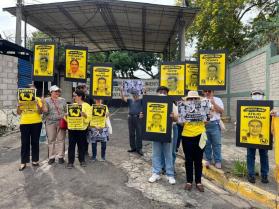Interview: Alexis Stoumbelis, director of CISPES, on mining-related deaths in El Salvador
By Matthew Kennard, from the Comment Factory
In a six-day period over Christmas, two prominent anti-mining activists in El Salvador were shot dead in broad daylight. First,Ramiro Rivera Gomez, vice-president of the Cabanas EnvironmentCommittee, which is campaigning to stop Canadian mining company PacificRim from opening a gold mine in the area, was killed while walking withhis 14-year-old daughter. Six days later, Dora “Alicia” Recinos Sortowas shot returning from washing laundry in a nearby lake. She was eightmonths pregnant and another prominent member of the CEC.
Below, Alexis Stoumbelis (AS) discusses the issues around the murders and anti-mining resistance.
MK: Why has there been such a concerted campaign against Pacific Rim’s gold mine?
AS: The biggest opposition to Pacific Rim’s gold mine is due to thecommunity’s concerns about severe environmental damage, specificallythe risk of cyanide contamination and the massive amounts of water thatwould be used during the extraction, estimated at 10.4 liters/second.
This is a very rural community that depends on farming, cattle ranchingand fishing, all of which are at risk if the mine were to open. Also,the community borders the Lempa River, which provides drinking water toover half the population of the capital city. After community leaderslike Ramiro Rivera and José Santos Rodriguez visited a communityaffected by gold mining in Honduras and saw the terrible public healthimpact of cyanide, it really catalyzed the community organizing to stopthe mines from opening in Cabañas. Ramiro Rivera was killed on December20th and José Santos Rodriguez’ partner Dora Alicia Sorto Recinos was killed on December 26th while carrying their 2 year old son.
MK: Are PacRim suspected to be involved in the murders?
AS: Many community members in San Isidro and Nueva Trinidad believethat Pacific Rim is involved in the murders due to their personalinteractions with paid company “promoters” like Oscar Menjívar, who wasarrested for the attempted murder of Ramiro Rivera in August. PacificRim denies he was ever an employee.
The international community has joined with the anti-mining movementin El Salvador in calling for a thorough and transparent investigationinto all of the assassinations, the attempted kidnappings and the deaththreats to find out who is really behind this violence. The systematicand targeted nature of these murders suggests a concerted effort toeliminate the leadership of an effective resistance movement and tointimidate others out of joining the struggle. If I were a detective, Iwould ask, “Who stands to benefit from eliminating the leadership of ananti-mining movement?”
One thing that is clear is that the continued presence of PacificRim in the community despite widespread opposition and despite havingbeen denied the mining permits has created a climate of violence,regardless of whether they are directly involved or not. The onlyethical thing for the company to do at this point is to leave ElSalvador and to withdraw the lawsuit.
MK: Has the conduct of mining companies in the developing world improved over the last decade or so?
AS: The recent murders of mining organizers in Mexico and Guatemala,and horrendous toxic waste spills such as at Barrick Gold’s North Maramine in Tanzania, makes it very hard for the mining companies toconvince us that their conduct as improved. What has changed is themining companies’ attention to and investment in projecting an image ofthemselves as socially and environmentally responsible. In many waysthis has been due to effective consumer campaigns like “No Dirty Gold”and some increased regulation but the companies have responded bychanging their image, not by profoundly altering their conduct. Whyelse would they spend so much time and money lobbying againstenvironmental or labor regulations?
MK: Do you think the protests will succeed?
AS: Yes. The community has already won the struggle and Pacific Rim will not be able to open the mine.
The community protests in San Isidro forced Pacific Rim to ceasemost operations in 2008 and street blockades in Trinidad prevented themining equipment from entering the neighborhood. In just a few years,the National Coalition against Metallic Mining in El Salvador hastransformed mining from a local concern to a national issue; in 2007,over 62% of the population was opposed to mining according to a poll bythe University of Central America. The opposition to mining has becomeso widespread that the presidential candidates from every politicalparty, including the most conservative, spoke out against gold miningbefore the 2009 elections.
El Salvador alone has the decision whether or not to grant PacificRim the mining permits, which they have twice denied. In desperation,Pacific Rim has brought a lawsuit for hundreds of millions of dollarsagainst El Salvador through CAFTA and the World Bank but the World Bankdoes not have the authority to grant the mining permits. The lawsuit isa last-ditch effort to salvage some profits, but Pacific Rim hasalready lost, as the El Dorado mine will not open.

 "I am a CISPES supporter because continuing to fight for social justice and a more people-centered country means continuing the dream and sacrifice of thousands of my fellow Salvadorans who died for that vision.” - Padre Carlos, New York City
"I am a CISPES supporter because continuing to fight for social justice and a more people-centered country means continuing the dream and sacrifice of thousands of my fellow Salvadorans who died for that vision.” - Padre Carlos, New York City

